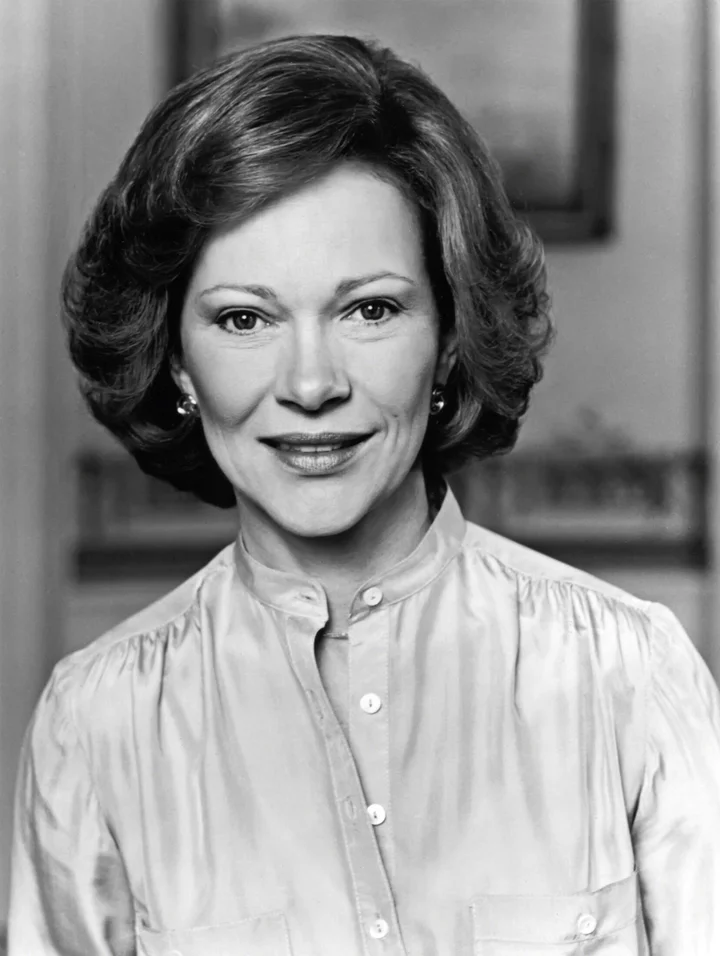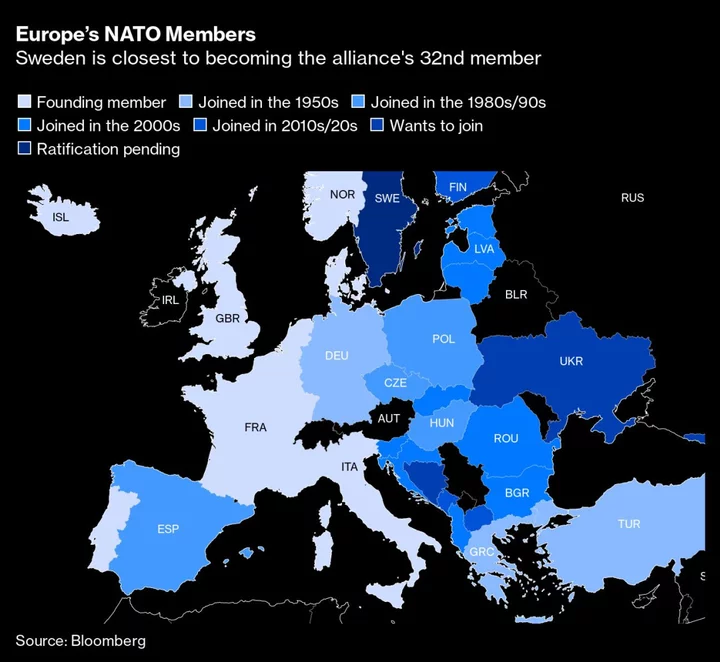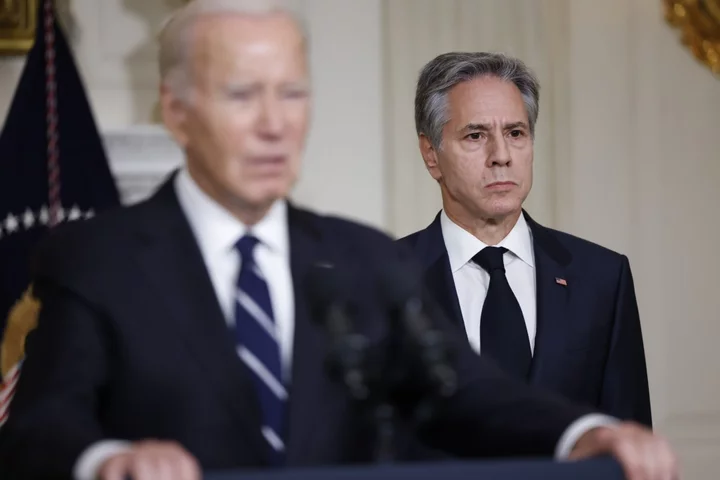Rosalynn Carter, who broke new ground as an activist US first lady by attending her husband’s Cabinet meetings and leading a presidential effort to improve care for the mentally ill, all while raising a young daughter at the White House, has died. She was 96.
Carter died peacefully at her home in Plains, Georgia, on Sunday with family by her side, the Carter Center said in a statement. In May, the Carter family said she had been diagnosed with dementia while continuing to live “happily at home” with her husband, former President Jimmy Carter, who was receiving hospice care. She began at-home hospice care as well, earlier this month.
In a statement, the current president and first lady, Joe Biden and Jill Biden, said Carter “was a champion for equal rights and opportunities for women and girls; an advocate for mental health and wellness for every person; and a supporter of the often unseen and uncompensated caregivers of our children, aging loved ones, and people with disabilities.”
They added, “May God bless our dear friend.”
To her husband, Rosalynn Carter was an irreplaceable adviser and partner during his terms as Georgia governor and, from 1977 to 1981, as the 39th president of the US. Her presence at Cabinet meetings, starting in 1978, “proved her unprecedented status,” Gil Troy, a history professor at McGill University in Montreal, wrote in his 2000 book on presidential couples.
The couple’s “relationship in the White House was something new and historic,” Jonathan Alter wrote in his 2020 biography of Jimmy Carter, as evidenced by the working lunch they had every Tuesday, at which they would “nibble salads and discuss personnel, her pet projects, campaign strategy, foreign policy challenges and other matters of substance.”
The first presidential spouse with her own policy staff, Carter was appointed to lead the presidential commission on mental health that her husband created. She also appeared as a witness at a 1979 hearing on the topic held by a Senate subcommittee.
The recommendations of her commission helped spur passage of a 1980 federal law that increased government funding to mental health programs. President Ronald Reagan, a Republican, rescinded the law after taking office the following year.
Carter’s high level of engagement at the White House generated comparisons to Eleanor Roosevelt. A more traditional former first lady, Mamie Eisenhower, once confessed to being “somewhat taken aback by the variety and extent of my projects,” Carter revealed in her 1984 memoir, First Lady From Plains.
A New York Times profile during the 1976 presidential campaign said Carter’s tireless campaigning “evokes the image of a steel magnolia blossom.” The nickname “Steel Magnolia” stuck. So did the president’s description of his wife as “an almost equal extension of myself.”
Grain Embargo
Her influence did have its limits. She said she tried, without success, to persuade her husband to wait until after the Iowa presidential caucuses of 1980 to impose a grain embargo against the Soviet Union. The embargo hurt US farmers by cutting off an avenue for sales of their corn, wheat and soybeans.
“I am much more political than Jimmy and was more concerned about popularity and winning reelection,” Carter wrote in her memoir, “but I have to say that he had the courage to tackle the important issues, no matter how controversial — or politically damaging — they might be.”
Jimmy Carter saw his popularity plummet during a term marred by soaring inflation and the holding of American hostages in Iran. He was trounced by Reagan in the 1980 election.
He later recalled, “Rosalynn was much more grieved and despondent than I was.”
Born on Aug. 18, 1927, in Plains, Georgia, population 600, Eleanor Rosalynn Smith was the embodiment of small-town connections.
Her father, Edgar, ran a farm, owned an auto-repair store and drove a school bus. He married Allie Murray, nine years his junior, in 1926 after she finished college with a teaching degree. The two had met years earlier when, as a high school student, she rode his bus.
Rosalynn, the first of their four children, was followed by two brothers, Jerry and Murray, and then a sister, Lillian Allethea — named after a beloved local nurse, Lillian Carter, known as “Miss Lillian,” whose family ran a farm just outside town.
High School Crush
Young Rosalynn became close friends with Miss Lillian’s daughter, Ruth Carter, and developed a crush on Ruth’s older brother Jimmy, a Navy cadet. The crush endured as Rosalynn graduated high school in 1944 as class valedictorian and entered Georgia Southwestern College, then a two-year program, in nearby Americus. It was later renamed Georgia Southwestern State University.
“I couldn’t keep my eyes off the photograph of her idolized, older brother pinned up on her bedroom wall,” the future first lady recalled. “He seemed so glamorous and out of reach.”
Ruth Carter arranged a meeting in the summer of 1945. Jimmy, 20, and Rosalynn, 17, quickly became a couple. Home for Christmas from the Naval Academy in Annapolis, Maryland, he proposed. Rosalynn said it was too early. Two months later, visiting Annapolis, she accepted.
Not everybody was pleased. The future president’s father, Earl, “was ambitious for Jimmy, had great plans for him, and being married to an 18-year-old girl from Plains was not one of them,” Rosalynn later wrote.
The couple married July 7, 1946, after Rosalynn’s graduation from Georgia Southwestern. They began the peripatetic life of a military family, living near bases in Connecticut, Hawaii and California. She gave birth to their first three children: sons Jack, Chip and Jeff.
Jimmy Carter resigned his naval commission and returned home after the death of his father in 1953 to take over the family’s peanut-farming seed-supply businesses.
Georgia Campaigns
Rosalynn Carter held down the farm as her husband embarked on a political career, starting with a successful bid for the Georgia Senate in 1962. She researched issues for him in his campaigns for governor in 1966 and then, successfully, in 1970. In 1967, she gave birth to their fourth child, daughter Amy.
As Georgia’s first lady, Carter developed her passion for mental-health issues, serving on a commission that recommended a shift from large state institutions to smaller mental-health centers. Her husband enacted the change.
She made her debut as a national figure in the 1976 campaign for the Democratic presidential nomination, visiting 34 states. Deeply religious, she said she took a moment to pray before a speech or interview. A favorite fashion accessory was a tiny gold pin in the shape of a peanut.
Once in the White House, she took a crash course in Spanish to prepare for a 13-day, seven-nation diplomatic tour of Latin America that was more substantial in tone than most goodwill trips of her predecessors. The headline of a New York Times news analysis called her “Ambassador Rosalynn Carter.”
Her “most historic role” as first lady came in the field of children’s health, Alter wrote in his biography of the former president. With Betty Bumpers, the wife of Arkansas Senator Dale Bumpers, Carter went state-to-state to promote preschool immunizations, ultimately persuading 33 states to enact bills mandating proof of vaccination before children entered kindergarten or first grade. She later took the push abroad.
In all, she “helped prevent tens of millions of children from getting sick and saved tens of thousands of lives worldwide,” Alter wrote.
All the while, Carter was tending to daughter Amy, who was 9 when the family moved into the White House. Their three sons by then were adults. The Carters opted to send her to Washington’s public schools, and Rosalynn accompanied Amy to her first day of classes. When Amy took up the violin, so did her mom, and they practiced together.
The Carters returned to Plains after the 1980 election. Rosalynn Carter continued to pursue her interest in mental health by hosting seminars at Emory University and creating the Rosalynn Carter Institute for Caregiving at her alma mater.
With her husband, she founded the Atlanta-based Carter Center, which advocates human rights around the world. She accompanied her husband on many of the humanitarian missions for which he was honored with the 2002 Nobel Peace Prize.
(Adds quote from Bidens in third paragraph.)









